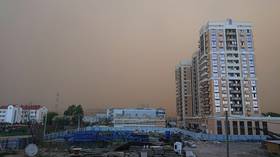To tackle problem of space junk, ‘cyber-farmer’ proposes building future satellites out of MUSHROOMS

A so-called ‘cyber-farmer’ who has worked with NASA is proposing the development of a new type of satellite built out of mycelium fibers to tackle the growing problem posed by space debris.
According to the ESA's Space Debris Office (SDO) there are over 6,900 artificial satellites in Low Earth Orbit (LEO), and the area is becoming more crowded all the time thanks to the burgeoning private aerospace industry.
Each new satellite blasted into orbit increases the risk of a collision that would exacerbate the existing issue of space debris in orbit.
As satellites are decommissioned and deorbited, through collisions or on purpose, they burn up as they re-enter the atmosphere, leaving behind toxic chemicals and metal particles which can linger for years.
To combat both of these problems, cybersecurity expert, former US Marine, and “Cyber Farmer” Max Justice proposes making satellites out of mushroom fibers.
“Depending on the type of mycelium used, it can be more flexible than wood and/or stronger than wood, it’s lighter than wood, and naturally much more fire-retardant. I even took a propane torch to one of my mycelium blocks for over 5 minutes and all it did was smoke,” Justice claims.
Drawing on his years of experience in the aerospace industry, Justice says satellites composed of mycelium fibers would be both heat-resistant and environmentally friendly, and would be more likely to remain intact than their traditional metallic counterparts in the event of an LEO collision.
Mycelium fibers are extracted from the roots of fungi, namely mushrooms, and can then be grown into customized structures which, when dried, are extremely tough yet lightweight.
These plant-based fibers are currently being investigated for use in the construction and manufacturing industries, including eco-friendly housing, insulation, and plastics.
Also on rt.com Magic mushroom treatment on par with pharma drugs for combating depression, study findsBut Justice, who has worked with the National Reconnaissance Office (NRO), the National Geospatial-Intelligence Agency (NGA), and NASA for over 15 years, is pioneering the development of mushroom-based aerospace tech.
According to SDO figures, some 560 explosive satellite breakups, collisions and other fragmentation events have taken place in low orbit since Sputnik 1 first reached orbit in 1957.
This leads to what is known as “Kessler syndrome,” in which collisions and satellite fragmentations become increasingly frequent and raise the likelihood of triggering a catastrophic chain reaction.
Also on rt.com Billionaire brawl: Musk blasts Bezos’ Amazon over effort to ‘hamstring’ SpaceX Starlink satellite internet projectSpaceX is averaging deployment of an additional 300 mini Starlink satellites per month since March 2021, up from about 60 per month since May 2019. The company has stated an eventual goal of 12,000 mini-satellites forming an artificial constellation in LEO.
Meanwhile, Amazon is planning its own constellation of over 3,200 satellites. While the private space industry has yet to commit to fungus-formed satellites, the unusual solution may soon become commonplace in the skies above Earth as space agencies look to mitigate the growing risk to their activities above the planet and beyond.
Think your friends would be interested? Share this story!













